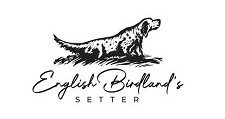Breed questions
What is typical for the breed English Setter?
The English Setter is a hunting dog through and through, ready to be carried away by a scent in the air at any time. In addition to a high need of running and excercise, he brings with him a high degree of independence and self-reliance, which shows in the fact that he works at a large distance to his owner. At home English setters are balanced and good natured towards people and very friendly towards other dogs.
More detailed information: http://www.english-setter-club.de/rasse/eigenschaften.html
Wherein exactly lies the fascination for the breed?
Part of the fascination is founded on the appearance, the beauty of the English Setter. The long, slightly wavy coat, the gentle expression of the eyes combined with the intelligent look are very appealing.
The main fascination, the core of the breed, is based on the typical working STYLE of the English Setter. Its elegance, the smoothness of its movements, its flowing gallop, its cat-like-ness, all this makes the breed unmistakable and unique among the hunting dogs. These characteristics, combined with a love of speed, dynamism and game sense, convey an aesthetic from which it is difficult to escape.
For whom is the English Setter the ideal dog?
For people who are looking for a passionate hunting dog, an active life companion; for people who are willing to engage with the genetic abilities of a pointing specialist, to shape and educate him without bending and breaking him; for people who are able to be delighted by the elegance and softness, by the suppleness, but also by the speed and independence of an English Setter. People who want a four-legged companion in whose friendliness and balance they can put their full trust in everyday and family life.
What are the weak points of the English Setter?
Due to his breeding selection and genetic fixation as a specialist pointing dog, the English Setter will not show the same performance as some of the all-round hunting breeds that were bred as generalist / "all-rounder" - or they may need extra support in some of the all-rounder disciplines.
The ES should hunt silently and has been bred to hunt whilst carrying a high head, nose searching for air scent. Also, the ES typically does not have distinctive (predator) game sharpness, no large protective instinct, and certainly no guarding attitude towards humans. In addition, they are more sensitive than many of the continental Hunt-Point-Retrieve breeds; their training must therefore be carried out with care.
Still, these characteristics cannot really be called "weaknesses". They are breed-specific traits that are all part of the positive qualities of the English Setter.
Aims
What are the characteristics of the 'English Birdland's'?
I breed English Setters for idealistic reasons. My aim for the "English Birdland's" is obviously that I only wish for the best - but what is the best?
My first priority is healthy dogs; healthy in body and mind: on the one hand the parents are free from physical limitations and on the other hand they have a healthy mentality which is expressed by a general good temperament, a settled personality, being balanced and outgoing. In addition to these attributes, I value the working STYLE of the selected breeding partners highly. My goal is to give our puppies the greatest possible vitality, resistance, strong instincts, mental and physical performance, adaptability and longevity.
To achieve this, I try to judge my own dogs objectively, to recognize their strengths and weaknesses and to speak of them honestly and transparently. For me, breeding is SELECTION of the best, with careful choice of the parents, especially the dam. I do not breed simply for the sake of breeding, nor for monetary or personal motives, but with the ideal goal of improving the English Setter as a breed.
How important are show aspects and the breed standard for the 'English Birdland's'?
Beauty lies in the eye of the beholder, it is subjective. For many years the breed has had two divergent breeding directions: working lines and show lines. Over the years the established breed standard in England, the country of origin, has developed away from the functional dog and today describes dogs of the show type rather than dogs of the traditional working type.
Our kennel "English Birdland's" is registered with the English Setter Club Deutschland e.V., which looks towards the countries with top class working English Setters i.e. to Italy, France and Spain. In these countries, the selection of the parent animals primarily follows performance criteria, which means that the outer appearance (the exterior) comes second to the criteria of an ideal robust hunting dog for the hunting field. The breed standard is of course important to the “English Birdland's”, but in terms of size, physique and coat, we look towards the original idea of the English Setters – a breed of elegant, agile working dogs that excel in the field.
How important is coat colour as a breed aim?
The colour of the English Setter is unique. However, criteria such as health, mentality and performance are far more important to me than the colour variety of the coat - simply because color is purely a visual attribute. Certain requirements of the standard should, of course, be fulfilled (base colour white, dark eyes, dark nose, full pigment around the eye) to give the English Setter an appealing expression and its breed-specific appearance. The breeding of a special colour (for example blue belton or tricolor) is not a focus of our kennel "English Birdland's".
Puppies
Will the puppies be sold to hunters only?
No, the hunting license is not mandatory if you’d like to have a puppy from the "English Birdland's". BUT: What is essential is that you are aware that you are getting a high passionate 100% hunting dog with special characteristics and that you know and understand the needs of such a dog. You should be willing to encourage its abilities and qualities; in the least you must be able to fulfill their basic needs for sufficient exercise and activity.
At what age do the puppies go to their new owners?
When the puppies are eight weeks old they will have their first vaccination and can move to their new homes shortly afterwards. Before that, they have been dewormed several times, registered in the studbook of the English Setter Club Germany, have been microchipped and will receive a pedigree approved by the FCI, the VDH (German Kennel Club) and JGHV (German hunting dog association), or (if necessary) an export pedigree.
Should you want to pick up your puppy later and/or if you live abroad, we can discuss the possibilities and details. If you are transporting the puppy abroad, we advise you to check the regulations in your home country on the import of a puppy.
Can I choose my own puppy?
Yes, absolutely. If desired we are happy to give you advice on which puppy will suit your requirements best - especially considering the future way of working your dog. As breeder we observe the little ones for weeks, follow their development and are familiar with the characteristics of the individual protégés. We as breeders and the owner of the sire reserve priority to choose a puppy for ourselves.



























